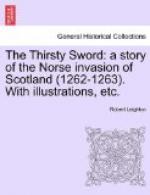The garrison had been reinforced by many men from the ships of Coll. But the men of Bute were desperate, and they said that though they gave their lives, and though they pulled down every stone and timber of which that castle was built, they would save their young king. So with their friends of Arran they landed in a great body with their machines and battering engines. Some attacked the raised drawbridge with great missile weapons, while their companions picked off with their arrows the archers who were on the battlements.
After a two-hours’ storming of the gates the men of Bute forced an entrance and rushed within the castle, led by Allan Redmain. The defenders took timely refuge in the donjon keep. But Allan sought not to follow them. With lighted torches he led his men into the dark chambers that were in the heart of the castle, till at last he found a chamber whose floor was stained with blood.
“Methinks,” said he, “that this should be the place wherein Duncan slew his three foes with the Earl Kenric’s sword;” and then he called loudly upon Kenric.
Many times he cried out, but no answer came. Then he bade one of his men uncoil a rope that he had brought, and Allan, fastening a lighted torch in his helmet, let himself be lowered into the dungeon whose mouth gaped in the centre of the floor.
Deep down he went until his feet touched solid ground and he found himself in a large cavernous chamber. It was a dismal place. The rocky walls were damp and mouldy; the floor was of hewn stone. There was an odour as of death in the heavy air.
Holding his torch aloft he peered into the recesses of the dungeon. At last his eye rested upon what looked like a human form. He started back in horror as the light fell fuller upon it. Against the wall, crouched down with his head between his knees, and a few rags of mouldy plaid about his shoulders, was the grim skeleton of what had once been a living man.
Allan drew back the tattered plaid and saw the bare ribs and fleshless arms. And could it be that the young hope of Bute, Kenric the good, the brave, the true, had come to this?
Allan bent down. He was about to touch the ghastly thing. Then the awful silence of that black tomb was broken by the sound of a low moan. Allan listened again, but he heard only the drip, drip of water. Then again came the moaning sound. He turned round and bounded forward. By the light of his torch, that pierced the darkness, he saw a pale wan face, with hollow cheeks and round, staring, brown eyes. The lips moved.
“Allan? Allan?” they faintly said.
And then Kenric raised himself on his elbow.
“The great God be thanked!” gasped Allan, and he fell upon his knees at Kenric’s side.
Kenric spoke not again: he was faint and sore of limb. Allan took off his plaid and spread it upon the damp, rocky floor. Then he raised Kenric in his arms, and wrapping him in the plaid carried him to the bottom of the shaft where hung the rope. Making a sling of his plaid and securing it to the rope he called to his men to draw up the line, and in a few minutes Earl Kenric lay in the upper chamber breathing the fresher air.




